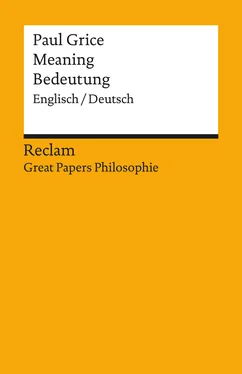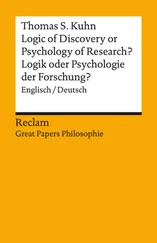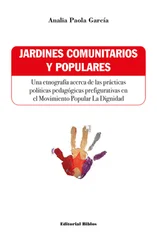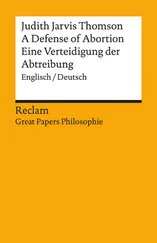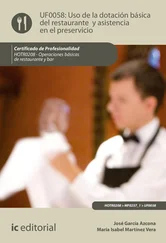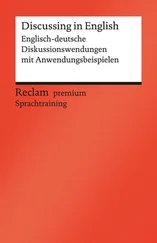Paul Grice
Meaning
Bedeutung
Englisch / Deutsch
Aus dem Englischen übersetzt und herausgegeben von Jonas Pfister
Reclam
Die Originalpaginierung wird in eckigen Klammern wiedergegeben.
2020 Philipp Reclam jun. Verlag GmbH, Siemensstraße 32, 71254 Ditzingen
Gesamtherstellung: Philipp Reclam jun. Verlag GmbH, Siemensstraße 32, 71254 Ditzingen
Made in Germany 2020
RECLAM ist eine eingetragene Marke der Philipp Reclam jun. GmbH & Co. KG, Stuttgart
ISBN 978-3-15-961770-1
ISBN der Buchausgabe 978-3-15-019584-0
www.reclam.de
Meaning Bedeutung
Consider the following sentences:
“Those spots mean (meant) measles.”
“Those spots didn’t mean anything to me, but to the doctor they meant measles.”
“The recent budget means that we shall have a hard year.”
(1) I cannot say, “Those spots meant measles, but he hadn’t got measles,” and I cannot say, “The recent budget means that we shall have a hard year, but we shan’t have.” That is to say, in cases like the above, x meant that p and x means that p entail p .
(2) I cannot argue from “Those spots mean (meant) measles” to any conclusion about “what is (was) meant by those spots”; for example, I am not entitled to say, “What was meant by those spots was that he had measles.” Equally I cannot draw from the statement about the recent budget the conclusion “What is meant by the recent budget is that we shall have a hard year.”
(3) I cannot argue from “Those spots meant measles” to any conclusion to the effect that somebody or other meant by those spots so-and-so. Mutatis mutandis , the same is true of the sentence about the recent budget.
(4) For none of the above examples can a restatement be found in which the verb “mean” is followed by a sentence or phrase in inverted commas. Thus “Those spots meant measles” cannot be reformulated as “Those spots meant ‘measles’” or as “Those spots meant ‘he has measles.’”
(5) On the other hand, for all these examples an approximate restatement can be found beginning with the phrase “The fact that …”; for example, “The fact that he had those spots meant that he had measles” and “The fact that the recent budget was as it was means that we shall have a hard year.”
Now contrast the above sentences with the following:
“Those three rings on the bell (of the bus) mean that the ‘bus is full.’” [378]
“That remark, ‘Smith couldn’t get on without his trouble and strife,’ meant that Smith found his wife indispensable.”
(1) I can use the first of these and go on to say, “But it isn’t in fact full – the conductor has made a mistake”; and I can use the second and go on, “But in fact Smith deserted her seven years ago.” That is to say, here x means that p and x meant that p do not entail p .
(2) I can argue from the first to some statement about “what is (was) meant” by the rings on the bell and from the second to some statement about “what is (was) meant” by the quoted remark.
(3) I can argue from the first sentence to the conclusion that somebody (viz., the conductor) meant, or at any rate should have meant, by the rings that the bus is full, and I can argue analogously for the second sentence.
(4) The first sentence can be restated in a form in which the verb “mean” is followed by a phrase in inverted commas, that is, “Those three rings on the bell mean ‘the bus is full.’” So also can the second sentence.
(5) Such a sentence as “The fact that the bell has been rung three times means that the bus is full” is not a restatement of the meaning of the first sentence. Both may be true, but they do not have, even approximately, the same meaning.
When the expressions “means,” “means something,” “means that” are used in the kind of way in which they are used in the first set of sentences, I shall speak of the sense, or senses, in which they are used, as the natural sense, or senses, of the expressions in question. When the expressions are used in the kind of way in which they are used in the second set of sentences, I shall speak of the sense, or senses, in which they are used, as the nonnatural sense, or senses, of the expressions in question. I shall use the abbreviation “means NN” to distinguish the nonnatural sense or senses.
I propose, for convenience, also to include under the head of natural senses of “mean” such senses of “mean” as may be exemplified in sentences of the pattern “ A means (meant) to do so-and-so (by x ),” where A is a human agent. By contrast, as the previous examples show, I include under the head of non-natural [379] senses of “mean” any senses of “mean” found in sentences of the patterns “ A means (meant) something by x ” or “ A means (meant) by x that. …” (This is overrigid; but it will serve as an indication.)
I do not want to maintain that all our uses of “mean” fall easily, obviously, and tidily into one of the two groups I have distinguished; but I think that in most cases we should be at least fairly strongly inclined to assimilate a use of “mean” to one group rather than to the other. The question which now arises is this: “What more can be said about the distinction between the cases where we should say that the word is applied in a natural sense and the cases where we should say that the word is applied in an nonnatural sense?” Asking this question will not of course prohibit us from trying to give an explanation of “meaning NN” in terms of one or another natural sense of “mean.”
This question about the distinction between natural and nonnatural meaning is, I think, what people are getting at when they display an interest in a distinction between “natural” and “conventional” signs. But I think my formulation is better. For some things which can mean NNsomething are not signs (e. g., words are not), and some are not conventional in any ordinary sense (e. g., certain gestures); while some things which mean naturally are not signs of what they mean (cf. the recent budget example).
I want first to consider briefly, and reject, what I might term a causal type of answer to the question, “What is meaning NN?” We might try to say, for instance, more or less with C. L. Stevenson,1 that for x to mean NNsomething, x must have (roughly) a tendency to produce in an audience some attitude (cognitive or otherwise) and a tendency, in the case of a speaker, to be produced by that attitude, these tendencies being dependent on “an elaborate process of conditioning attending the use of the sign in communication.”2 This clearly will not do.
(1) Let us consider a case where an utterance, if it qualifies at all as meaning NNsomething, will be of a descriptive or informative kind and the relevant attitude, therefore, will be a cognitive one, [380] for example, a belief. (I use “utterance” as a neutral word to apply to any candidate for meaning NN; it has a convenient act-object ambiguity.) It is no doubt the case that many people have a tendency to put on a tail coat when they think they are about to go to a dance, and it is no doubt also the case that many people, on seeing someone put on a tail coat, would conclude that the person in question was about to go to a dance. Does this satisfy us that putting on a tail coat means NNthat one is about to go to a dance (or indeed means NNanything at all)? Obviously not. It is no help to refer to the qualifying phrase “dependent on an elaborate process of conditioning….” For if all this means is that the response to the sight of a tail coat being put on is in some way learned or acquired, it will not exclude the present case from being one of meaning NN. But if we have to take seriously the second part of the qualifying phrase (“attending the use of the sign in communication”), then the account of meaning NNis obviously circular. We might just as well say, “ X has meaning NNif it is used in communication,” which, though true, is not helpful.
Читать дальше
